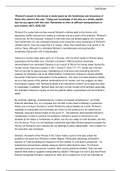Steff Boyes
“Richard’s ascent to the throne is made easier by the foolishness and innocence of
those who stand in this way.” Using your knowledge of the play as a whole, explain
how far you agree with this view. Remember to refer to different interpretations in
your answer. (AO1, AO5) [15]
Richard III is a play that revolves around Richard’s ruthless path to the throne, with
opposition swiftly overcome by means of a bloody end as a result of his ambition. Richard’s
victims are, for the most part, innocent in that they have not plotted against him; however,
their foolishness is to be contested because most characters show awareness of Richard’s
ruthless nature. One may argue that it is naivety, rather than foolishness, that results in his
victims’ fates, although it is ultimately Richard’s mercilessness and psychopathic
tendencies that govern who is dispensable.
Clarence’s murder takes place early on in the play, with his blind loyalty to Richard being
expressed until the bitter end - Richard Loncraine’s 1995 production physically
demonstrates how vulnerable Clarence is as a result of this by him being naked during the
murder scene. Clarence’s speech in Act I, Scene IV, lines 171-177, dwells upon the fact
that he has had no legal process, highlighting his innocence and illustrating Richard’s
capacity for disruption due to his determination. Furthermore, Clarence’s loyalty exhibits
the extent of Richard’s manipulation to the audience - this does not make Clarence foolish,
as he is fully aware of the political ramifications of his murder, but may suggest, as Harry
Cunningham argues, that “Richard is afraid of an internecine conflict” as he feels the need
to manipulate. In addition, Richard does not carry out the murder of his brothers personally
but maintains Clarence’s loyalty so that his political safety is guaranteed until his brother’s
death.
By contrast, Hastings, characterised as “a figure of colossal complacency”, as Orville
Prescott describes him, is a complete fool. He fails to take heed of Stanley’s portentous
dream and is smug in his plan to outwit Richard by using Catesby as a mole. Richard’s
capability to manipulate and immorality are shown to the audience by his reasoning for
Hastings’ execution being hinged on the word “if”. This perfectly demonstrates Richard’s
ruthlessness in order to achieve his ambitions. Richard’s ascent to the throne is not
dictated by the follies or foolishness of others, but his own ability to twist blunders, like this,
into his favour. Thus, it is not Hastings’ foolishness that helps Richard advance towards the
throne, but Richard’s own manoeuvres, as Hastings is easily dispensable - only a reason for
his execution was necessary.
Similarly, the death of the Princes in the Tower marks a point in the play where the
audience turn away from Richard in sheer disgust. Particularly disturbing is Richard’s
reaction to Tyrell accepting his request to kill the children in Loncraine’s production - he
experiences extraordinary sadistic pleasure that the deed shall be done. The Princes
represent purity and innocence; however, Nina Levine questions whether “they are wise
beyond their years or puppets manipulated by adults”? Although it is true to say that Prince
Edward recognises Richard’s capacity for harm and is suspicious of him (as indicated by





